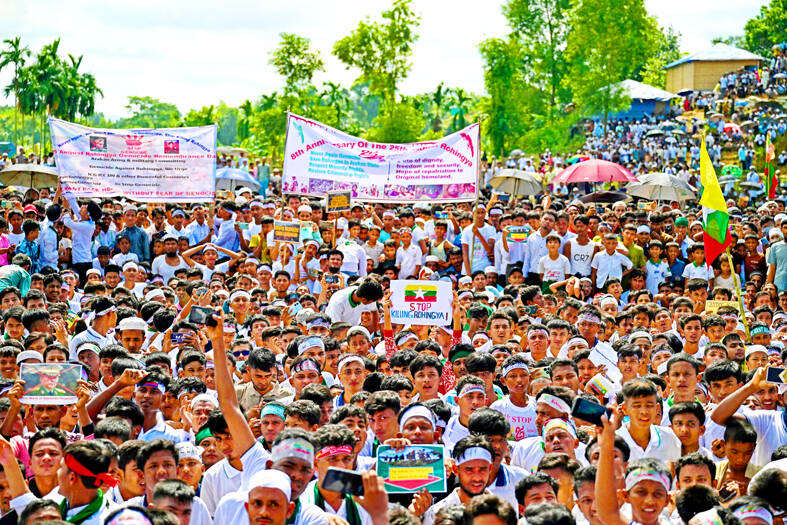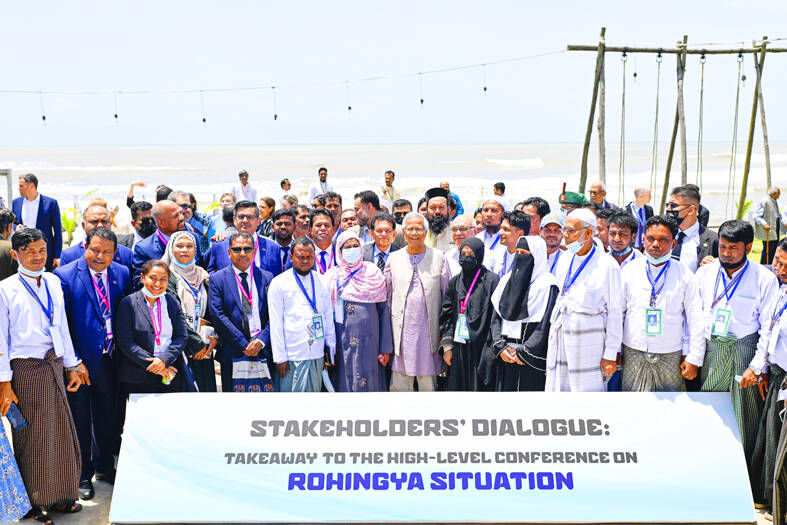Tens of thousands of Rohingya refugees from Myanmar living in dozens of camps in Bangladesh yesterday marked the eighth anniversary of their mass exodus, demanding a safe return to their previous home in Rakhine state.
The refugees gathered in an open field at a camp in Kutupalong, in the Cox’s Bazar district in southeastern Bangladesh, the site of a large refugee camp. They carried banners that read: “No more refugee life” and “Repatriation the ultimate solution.” They were marking what they called “Rohingya Genocide Remembrance Day.”
“We want to go back to our country with equal rights like other ethnic groups in Myanmar,” one of the protesters, 19-year-old Nur Aziz, told The Associated Press. “The rights they are enjoying in Myanmar as citizens of the country, we too want to enjoy the same rights.”

Photo: AFP
Bangladesh’s interim leader, Nobel Peace Prize laureate Muhammad Yunus, urged the international community to facilitate a process for their safe return, as he addressed a three-day conference on the Rohingya that began a day earlier in Cox’s Bazar.
International dignitaries, UN representatives, diplomats and Bangladesh’s interim government discussed supporting refugees with food and other amenities, and how to speed up the repatriation process.
Yunus said that the “relationship of Rohingyas with their homeland cannot be severed.”

Photo: AP
“Their right to return to their homeland has to be secured,” he said. “Therefore, we urge all parties and partners to work hard for charting a practical roadmap for their speedy, safe, dignified, voluntary and sustainable return to their homes in Rakhine as soon as possible.”
Myanmar launched a brutal crackdown in August 2017 following insurgent attacks on guard posts in Rakhine state. The scale, organization and ferocity of the operation led to accusations of ethnic cleansing and genocide from the international community, including the UN.
Hundreds of thousands of Rohingya Muslims began leaving Myanmar then. They traveled by foot and boats during shelling, indiscriminate killings and other violence in Rakhine state, which was captured by the Arakan Army insurgent group that has battled against Burmese government forces.
The Bangladesh government, which was led at the time by former prime minister Sheikh Hasina, ordered the border to be opened, eventually allowing more than 700,000 refugees to take shelter in the Muslim-majority nation.
The influx was in addition to more than 300,000 refugees who already had lived in Bangladesh for decades in the wake of previous violence perpetrated by Myanmar’s military.
Since 2017, Bangladesh has attempted at least twice to send the refugees back and has urged the international community to build pressure on Myanmar’s government to establish a peaceful environment that could assist their repatriation. The governments under Hasina and Yunus also have sought repatriation support from China.
However, the situation inside Myanmar has remained volatile, especially in Rakhine state. In Bangladesh, Rohingya refugees face challenges, including aid cuts by donors.
Yunus urged the regional and international stakeholders to continue to support the Rohingya people, including with financial support.
“We urge upon all to calibrate their relations with Myanmar and the Arakan Army and all parties to the conflict in order to promote an early resolution of this protracted crisis,” he said.

DAREDEVIL: Honnold said it had always been a dream of his to climb Taipei 101, while a Netflix producer said the skyscraper was ‘a real icon of this country’ US climber Alex Honnold yesterday took on Taiwan’s tallest building, becoming the first person to scale Taipei 101 without a rope, harness or safety net. Hundreds of spectators gathered at the base of the 101-story skyscraper to watch Honnold, 40, embark on his daredevil feat, which was also broadcast live on Netflix. Dressed in a red T-shirt and yellow custom-made climbing shoes, Honnold swiftly moved up the southeast face of the glass and steel building. At one point, he stepped onto a platform midway up to wave down at fans and onlookers who were taking photos. People watching from inside

A Vietnamese migrant worker yesterday won NT$12 million (US$379,627) on a Lunar New Year scratch card in Kaohsiung as part of Taiwan Lottery Co’s (台灣彩券) “NT$12 Million Grand Fortune” (1200萬大吉利) game. The man was the first top-prize winner of the new game launched on Jan. 6 to mark the Lunar New Year. Three Vietnamese migrant workers visited a Taiwan Lottery shop on Xinyue Street in Kaohsiung’s Gangshan District (崗山), a store representative said. The player bought multiple tickets and, after winning nothing, held the final lottery ticket in one hand and rubbed the store’s statue of the Maitreya Buddha’s belly with the other,

‘NATO-PLUS’: ‘Our strategic partners in the Indo-Pacific are facing increasing aggression by the Chinese Communist Party,’ US Representative Rob Wittman said The US House of Representatives on Monday released its version of the Consolidated Appropriations Act, which includes US$1.15 billion to support security cooperation with Taiwan. The omnibus act, covering US$1.2 trillion of spending, allocates US$1 billion for the Taiwan Security Cooperation Initiative, as well as US$150 million for the replacement of defense articles and reimbursement of defense services provided to Taiwan. The fund allocations were based on the US National Defense Authorization Act for fiscal 2026 that was passed by the US Congress last month and authorized up to US$1 billion to the US Defense Security Cooperation Agency in support of the

‘COMMITTED TO DETERRENCE’: Washington would stand by its allies, but it can only help as much as countries help themselves, Raymond Greene said The US is committed to deterrence in the first island chain, but it should not bear the burden alone, as “freedom is not free,” American Institute in Taiwan Director Raymond Greene said in a speech at the Institute for National Defense and Security Research’s “Strengthening Resilience: Defense as the Engine of Development” seminar in Taipei yesterday. In the speech, titled “Investing Together and a Secure and Prosperous Future,” Greene highlighted the contributions of US President Donald Trump’s administration to Taiwan’s defense efforts, including the establishment of supply chains for drones and autonomous systems, offers of security assistance and the expansion of